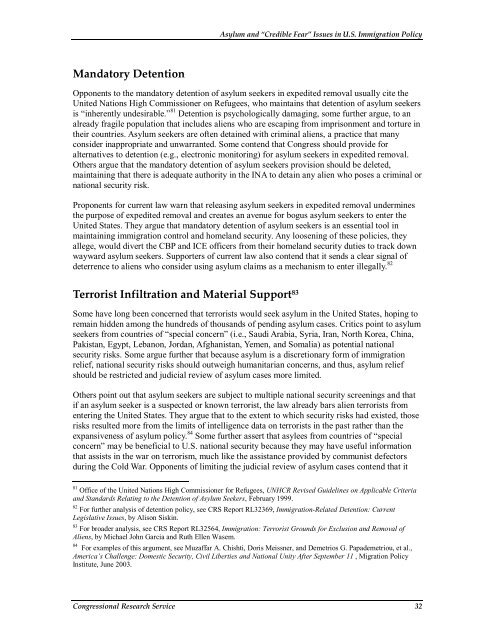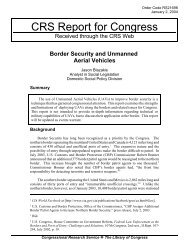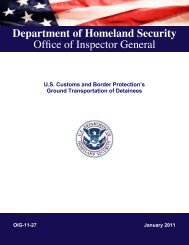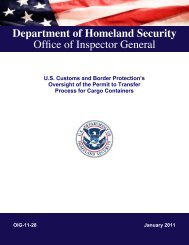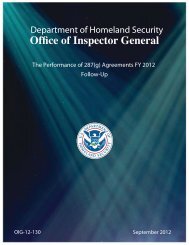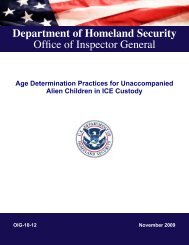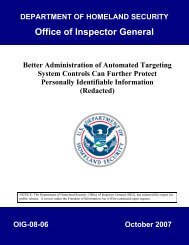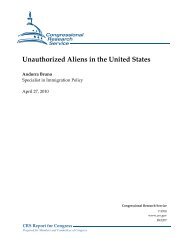Asylum and "Credible Fear" Issues in U.S. Immigration Policy
Asylum and "Credible Fear" Issues in U.S. Immigration Policy
Asylum and "Credible Fear" Issues in U.S. Immigration Policy
Create successful ePaper yourself
Turn your PDF publications into a flip-book with our unique Google optimized e-Paper software.
<strong>Asylum</strong> <strong>and</strong> “<strong>Credible</strong> Fear” <strong>Issues</strong> <strong>in</strong> U.S. <strong>Immigration</strong> <strong>Policy</strong>M<strong>and</strong>atory DetentionOpponents to the m<strong>and</strong>atory detention of asylum seekers <strong>in</strong> expedited removal usually cite theUnited Nations High Commissioner on Refugees, who ma<strong>in</strong>ta<strong>in</strong>s that detention of asylum seekersis “<strong>in</strong>herently undesirable.” 81 Detention is psychologically damag<strong>in</strong>g, some further argue, to analready fragile population that <strong>in</strong>cludes aliens who are escap<strong>in</strong>g from imprisonment <strong>and</strong> torture <strong>in</strong>their countries. <strong>Asylum</strong> seekers are often deta<strong>in</strong>ed with crim<strong>in</strong>al aliens, a practice that manyconsider <strong>in</strong>appropriate <strong>and</strong> unwarranted. Some contend that Congress should provide foralternatives to detention (e.g., electronic monitor<strong>in</strong>g) for asylum seekers <strong>in</strong> expedited removal.Others argue that the m<strong>and</strong>atory detention of asylum seekers provision should be deleted,ma<strong>in</strong>ta<strong>in</strong><strong>in</strong>g that there is adequate authority <strong>in</strong> the INA to deta<strong>in</strong> any alien who poses a crim<strong>in</strong>al ornational security risk.Proponents for current law warn that releas<strong>in</strong>g asylum seekers <strong>in</strong> expedited removal underm<strong>in</strong>esthe purpose of expedited removal <strong>and</strong> creates an avenue for bogus asylum seekers to enter theUnited States. They argue that m<strong>and</strong>atory detention of asylum seekers is an essential tool <strong>in</strong>ma<strong>in</strong>ta<strong>in</strong><strong>in</strong>g immigration control <strong>and</strong> homel<strong>and</strong> security. Any loosen<strong>in</strong>g of these policies, theyallege, would divert the CBP <strong>and</strong> ICE officers from their homel<strong>and</strong> security duties to track downwayward asylum seekers. Supporters of current law also contend that it sends a clear signal ofdeterrence to aliens who consider us<strong>in</strong>g asylum claims as a mechanism to enter illegally. 82Terrorist Infiltration <strong>and</strong> Material Support 83Some have long been concerned that terrorists would seek asylum <strong>in</strong> the United States, hop<strong>in</strong>g torema<strong>in</strong> hidden among the hundreds of thous<strong>and</strong>s of pend<strong>in</strong>g asylum cases. Critics po<strong>in</strong>t to asylumseekers from countries of “special concern” (i.e., Saudi Arabia, Syria, Iran, North Korea, Ch<strong>in</strong>a,Pakistan, Egypt, Lebanon, Jordan, Afghanistan, Yemen, <strong>and</strong> Somalia) as potential nationalsecurity risks. Some argue further that because asylum is a discretionary form of immigrationrelief, national security risks should outweigh humanitarian concerns, <strong>and</strong> thus, asylum reliefshould be restricted <strong>and</strong> judicial review of asylum cases more limited.Others po<strong>in</strong>t out that asylum seekers are subject to multiple national security screen<strong>in</strong>gs <strong>and</strong> thatif an asylum seeker is a suspected or known terrorist, the law already bars alien terrorists fromenter<strong>in</strong>g the United States. They argue that to the extent to which security risks had existed, thoserisks resulted more from the limits of <strong>in</strong>telligence data on terrorists <strong>in</strong> the past rather than theexpansiveness of asylum policy. 84 Some further assert that asylees from countries of “specialconcern” may be beneficial to U.S. national security because they may have useful <strong>in</strong>formationthat assists <strong>in</strong> the war on terrorism, much like the assistance provided by communist defectorsdur<strong>in</strong>g the Cold War. Opponents of limit<strong>in</strong>g the judicial review of asylum cases contend that it81 Office of the United Nations High Commissioner for Refugees, UNHCR Revised Guidel<strong>in</strong>es on Applicable Criteria<strong>and</strong> St<strong>and</strong>ards Relat<strong>in</strong>g to the Detention of <strong>Asylum</strong> Seekers, February 1999.82 For further analysis of detention policy, see CRS Report RL32369, <strong>Immigration</strong>-Related Detention: CurrentLegislative <strong>Issues</strong>, by Alison Sisk<strong>in</strong>.83 For broader analysis, see CRS Report RL32564, <strong>Immigration</strong>: Terrorist Grounds for Exclusion <strong>and</strong> Removal ofAliens, by Michael John Garcia <strong>and</strong> Ruth Ellen Wasem.84 For examples of this argument, see Muzaffar A. Chishti, Doris Meissner, <strong>and</strong> Demetrios G. Papademetriou, et al.,America’s Challenge: Domestic Security, Civil Liberties <strong>and</strong> National Unity After September 11 , Migration <strong>Policy</strong>Institute, June 2003.Congressional Research Service 32


